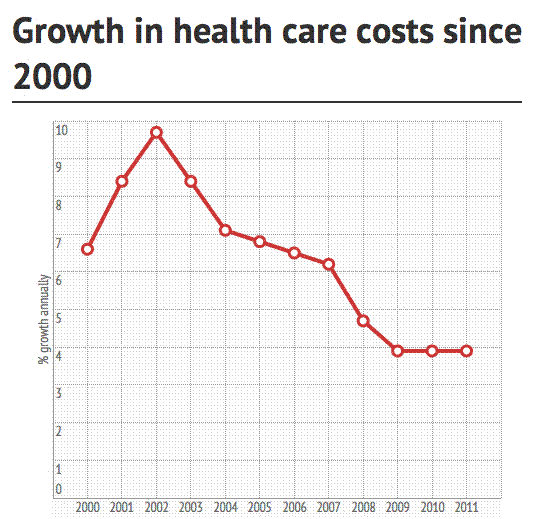A few weeks ago, Paul Krugman wrote up a Google poll showing Americans think the deficit is rising. In reality, the deficit has fallen by almost half. gThe public has no idea that the deficit has been falling like a stone,h he sighed.
The same is true on health care. A Kaiser Family Foundation survey finds that a majority of Americans think health-care costs are rising faster than normal. The reality is precisely the opposite. From 2000 to 2007, national health expenditures grew, on average, by 7.5 percent a year. From 2008 to 2011 — the most recent data we have — they grew, on average, by 4.1 percent a year. This is historically slow growth.
Ordinary Americans arenft the only ones misinformed. On Tuesday, House Speaker John Boehner blamed the law for gcausing premiums to soar.h.Assuming he continues to believe that any change in health premiums since 2009 is the result of Obamacare, hefll doubtless be pleased to know that the law is causing a historic slowdown in premiums.
I assume that last sentence will put an end to the House GOPfs repeal attempts.
But ordinary Americans have a better reason to think costs are rising. On Tuesday, Kaiser released survey data showing health-care costs are slowing for employers, too. But as Sarah Kliff noted, the data also showed that employees are seeing deductibles rise.
These trends arenft separate. Those higher deductibles are probably part of the reason costs are slowing. But they make health care feel more expensive to employees. And while economic theory suggests that the savings will eventually show up in wages, therefs little hard evidence itfs happening yet — and given the weakening relationship between firm performance and median wages, it might not happen at all.
This is a problem for Obamacare, and for any effort to bring down health costs. The health-care financing system is so fractured that itfs entirely possible for costs to fall overall even as they look like theyfre rising to families. The cost control efforts in Obamacare — or in any serious replacement — will mean, among other things, higher deductibles, tighter networks and more aggressively managed care.
That will mean savings, of course. And some of those savings will mean lower premiums for people in the individual market buying health insurance on their own. But the many Americans who get their health insurance through an employer or Medicare are going to feel the effect of the cost controls long before they ever feel the effects of the lower costs — if, indeed, they ever directly feel the effect of the lower costs.
Poll after poll shows that Americans want to see health-care costs brought down. But those polls are probably wrong. The American people certainly want to see their health-care costs brought down. But thatfs not the same thing as seeing total health-care costs fall. It can even be the exact opposite thing.
Americans arenft angry about health-care costs. Theyfre angry about the small fraction of health-care costs they directly pay.
